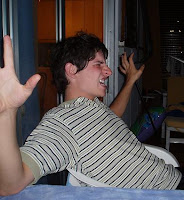 Benimaclet used to be a village in its own right; it is now a neighbourhood in transition, existing in a strange flux between village, neighbourhood, country, and city. About 200 metres from my 10 year old apartment block—a 12-story C-shaped structure with a semi-public patio garden in the centre—Benimaclet ends and the farm fields begin. The change is not softened by any musical flow into the country, there´s no soundtrack and Beethoven´s 6th symphony does not gradually and triumphantly usher you into the pristine, pastoral countryside. It just ends. You walk to the edge, there´s a huge empty roundabout, its 5 shiny black asphalt lanes throwing the sun into your eyes. Beside the roundabout there's a (famous) Horchatería, whose semi-paved parking lot fills up every Sunday night as Valencians from across the county come for their Horchata and Farton fix. On your right, beyond the green overgrown (cultivated?) ditch, which the Horchateria's patio (with it's farton frying hut!) looks out on, you can see green fields;
Benimaclet used to be a village in its own right; it is now a neighbourhood in transition, existing in a strange flux between village, neighbourhood, country, and city. About 200 metres from my 10 year old apartment block—a 12-story C-shaped structure with a semi-public patio garden in the centre—Benimaclet ends and the farm fields begin. The change is not softened by any musical flow into the country, there´s no soundtrack and Beethoven´s 6th symphony does not gradually and triumphantly usher you into the pristine, pastoral countryside. It just ends. You walk to the edge, there´s a huge empty roundabout, its 5 shiny black asphalt lanes throwing the sun into your eyes. Beside the roundabout there's a (famous) Horchatería, whose semi-paved parking lot fills up every Sunday night as Valencians from across the county come for their Horchata and Farton fix. On your right, beyond the green overgrown (cultivated?) ditch, which the Horchateria's patio (with it's farton frying hut!) looks out on, you can see green fields; they're so flat they seem nearly to be set in a depression. On your left, there's a—rather decrepid looking—football stadium. Straight-ahead and beyond: an 8 lane road, some semi-abandoned-looking fields, and, behind that, what looks like more city, or maybe suburbs, or maybe something in between. What you see in the distance is actually Alboraya, which, like Benimaclet, also used to be a village in its own right, and still remains more self-contained than Benimaclet, but appears also to be rapidly losing ground to development.
This photo is pretty representatitive of the low country surrounding Valencia. You can see the sea in the background. The distances look closer because of the flatness of the land. Don't ask me what they grow here, but I've seen some cucumbers and watermelons. There's a horrible smell that occasionally invades the city from the North. We call it the chorizo queso podrido smell because it smells like a mix of rotten cheese and salami. I've figured out—one particularly pestulent day when jogging through the countryside—that this odour originates from the fields, specifically, out of the irrigation chanels than run alongside them and which carry the spent drain-off from the fields. That's why the smell comes in waves and only on certain days: when the farmers decide to get their revenge on the city dwellers.
I discovered this group a few weekends ago at the Alternative Fair in the Turia gardens. It was encouraging to see so many dirty hippy types buying organic produce, eating vegetarian at the food stalls, slugging cold(ish) beers bought from entrepreneurs toting ice-filled garbage bins, talking to representatives from GREENPEACE, the local Palestian rights organization, etc. There seem to be lots of people in Valencia who care about saving the world, eating healthy food, and having a good time. I've never seen the Turia so dirty as the day after the fair though. It smelled like urine, beer bottles and broken glass were scattered across the ground, and each and every one of the skylights of the new subway station under the bridge (both of which are designed by Calatrava) were smashed into pieces. I grabbed some photos off the perlahorta website (the two pictures of fields and the last picture of a construction site). You can see the fields of La Huerta as well as some of the buildings typical of those being thrown up around Benimaclet. |


 Some people are angry about this (not the watermelons—I stuck that part in after, nor, for that matter, the smell, which was a still later addition). A community group called perlhorta ("for the Garden?"—horta is Valencian for huerta, which means garden. It's the name of this county in the province of Valencia)
Some people are angry about this (not the watermelons—I stuck that part in after, nor, for that matter, the smell, which was a still later addition). A community group called perlhorta ("for the Garden?"—horta is Valencian for huerta, which means garden. It's the name of this county in the province of Valencia) 





No comments:
Post a Comment